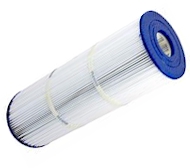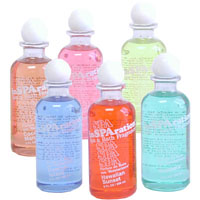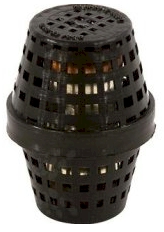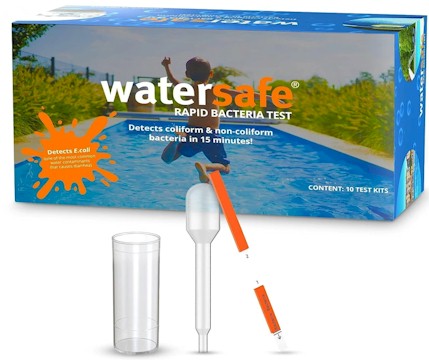|
|
269-978-1983
|
| |
|
|
|
|
|
|
|
|
|
|
|
|
|
|
Popular Products:
|
|
|
|
|
|
|
|
|
|
|
| |
|
Swimming Pool and Hot Tub Water:Problems with Algae
You are likely to encounter some unsightly algae growth in your water if:
- Your sanitizer is low
- Your pool or spa water is not balanced (meaning your pH and total alkalinity are not within the acceptable range)
- Your water is not circulating correctly and/or your water is not changed frequently enough (meaning your Total Dissolved Solids level is probably too high).
Make sure you not only treat the algae, but that you also treat the PROBLEM (one of the three above) to prevent the algae from coming back in the future. Your water is constantly being exposed to algae spores in the air, and they'll quickly take control in under-sanitized water, if given the chance. Algae needs sunlight to grow, so all it takes is a couple of hours on a sunny day for algae to appear in an under-maintained pool or spa. Aside from taking away from the crystal-clear water you work so hard to maintain, algae also serves as a feeding ground for bacteria that can be harmful to bathers.
Preventing Algae Growth
So long as your water is balanced, your sanitizer levels are kept at the proper levels (between 1 and 3 PPM*), and your water is properly circulated, you shouldn't encounter any algae problems. If you, however, feel that your pool or spa is more prone to algae (for example - you live in a more remote location and use well water for your fill water), you can surely keep it away with Pool Solutions Maintain Algaecide 50. Algae feeds primarily off of phosphates, so you might also want to try Sea-Klear Phosphate Remover to prevent algae. If you remove the food, you remove the algae!
*Unless you're using a mineral cartridge, like the SpaRx or the Nature2 cartridge. With the use of mineral cartridges, your chlorine levels can safely be kept at less than 1 PPM.
How to Treat Algae
There are over 20,000 types of algae in existence, but only 5 that commonly occur in pool or spa water.
And before you begin, remember - *NEVER begin any filter disassembly without first shutting off the circuit breaker, and bleeding any pool pressure systems (if you have one) with the pressure relief valve. You should also always check that everything is well secured after reassembling your filter before turning the circuit breaker on again.*
Green Algae
The most common type of algae. This is what causes that murky green water and fuzzy green growths. Green algae is relatively easy to treat.
How to treat green algae:
- Shock treat the water.
- Brush any visible algae from the pool or spa, if need-be.
- Clean or backwash your filter to get rid of any remaining algae spores.
- Add Pool Solutions Algae Control 10 to the water, following the dosage on the bottle.
- Throughout the process, continually circulate the water (unless you're removing/replacing the filter), in order to allow the chemicals to flow throughout the entire body of water.
Mustard Algae
Characterized by yellowish-green water and a yellowish-gold growth - usually on the shady side of the pool - that easily brushes away, but can be difficult to completely get rid of.
How to treat mustard algae:
- Brush any visible algae from your pool or spa surfaces. Then vacuum the waste from the pool.
- Shock treat the water.
- Treat your water with Pool Solutions Algae Prevent 30, following the dosage on the bottle.
- Brush again.
- Throughout the process, continually circulate the water (unless you're removing/replacing the filter), in order to allow the chemicals to flow throughout the entire body of water.
- The above steps should do the trick for this type of algae, but if it persists, Clean or backwash your filter to rid of any algae spores that could be left - particularly if you didn't remove the waste with a vacuum from steps 1 and 4.
Black Algae
This algae can be very difficult to treat, particularly in plastered pools, because the algae's roots plant themselves deep within the plaster. It's distinguished by rough, black spots on your pool or hot tub. Unless the roots are entirely destroyed, new algae will grow back in the same spot.
How to treat black algae:
- With some effort, scrub the black spots off of your pool/spa shell. Then vacuum the waste from the pool.
- Shock treat the water.
- Treat your pool or spa with Pool Solutions Algae Prevent 60 - the strongest form of algaecide for the most stubborn form of algae.
- Scrub the problem areas again. This is especially important when treating black algae, because you must scrub through the algae's protective layers, so the chemicals can completely destroy the plant.
- Clean or backwash your filter to get rid of any remaining algae spores.
- Throughout the process, continually circulate the water (unless you're removing/replacing the filter), in order to allow the chemicals to flow throughout the entire body of water.
Pink Slime
Not exactly algae, but is a fungus that causes a pink, slimy growth that brushes off easily.
How to treat pink slime:
- Shock treat the water.
- Brush any visible pink slime from the pool or spa. Then vacuum the waste from the pool.
- Clean or backwash your filter to get rid of any remaining fungi.
- Throughout the process, continually circulate the water (unless you're removing/replacing the filter), in order to allow the chemicals to flow throughout the entire body of water.
White Water Mold
Not exactly algae, but is a fungus that causes a white mucous or tissue paper-like looking substance that is very resistant to chlorine and bromine. If you see it on the inside surface of your spa, it means that it is well established in all of the plumbing lines and air blower lines of your pool, spa, or hot tub.
How to treat white water mold:
- Clean all affected surfaces.
- Clean and remove all visible white water mold.
- Shock treat the water.
- Allow the filter to run for 24 hours until the water is clear and your sanitizer is maintained at an appropriate level (between 1 and 3 Parts per Million).
- Soak your filter in GLB Granular Filter Cleanse to kill any remaining mold.
|
|










